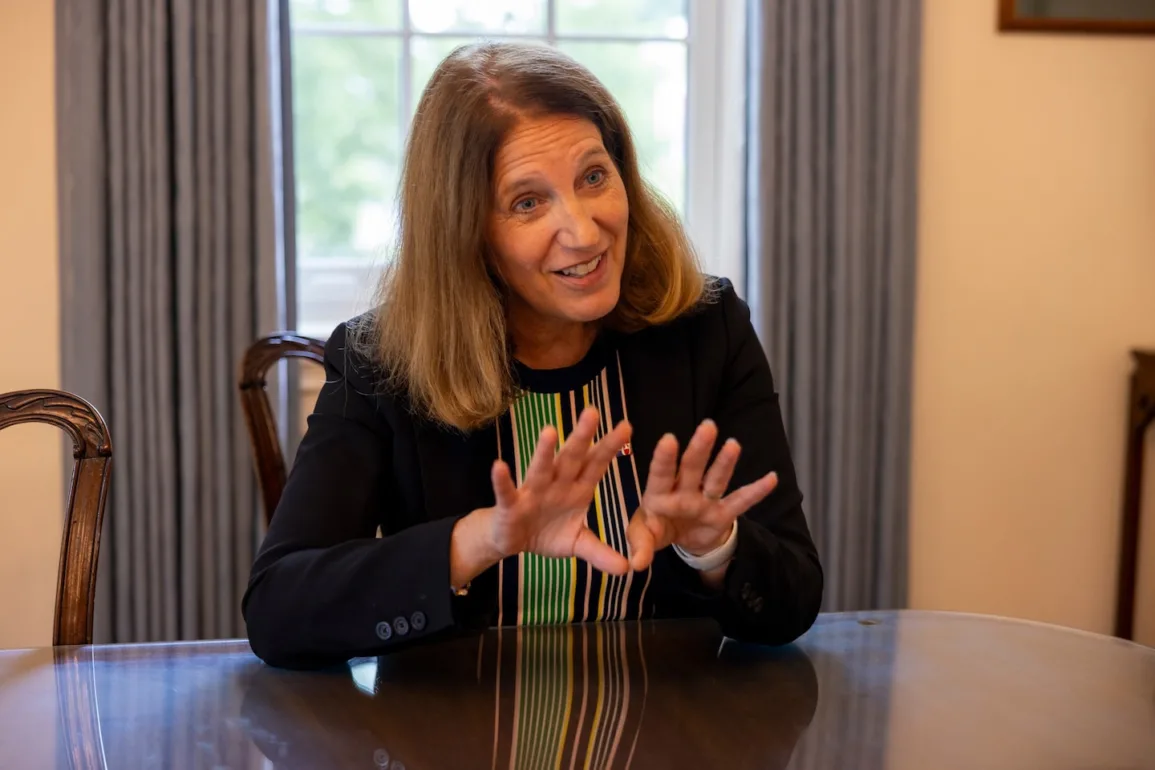Sylvia M. Burwell came to the presidency of American University six years ago with a decidedly unusual résumé. Unlike most of her peers in academia, she had never been a dean, a provost or even a professor. She did not have a master’s, PhD or other advanced degree.
Yet Burwell hardly seemed inexperienced. What she brought to AU in abundance was deep knowledge of the ways of Washington as a former director of the White House Office of Management and Budget and former U.S. secretary of health and human services in the Obama administration.
Those government leadership stints proved invaluable during the upheaval of the coronavirus pandemic — the campus shutdowns in 2020, the transition to online learning, the monitoring of infections, the reopening of residence halls and classrooms. They also informed her push for policies on diversity, inclusion and student health and her launch of a $500 million fundraising campaign called “Change can’t wait.”
On Tuesday, Burwell announced she will step down as AU’s president after the coming school year. The 58-year-old leader — who jokes “I do things in threes” — gave a trio of reasons for the timing. First, she said, the university is in strong shape. Second, AU has a team in place that is “ready for the next person to come in and really continue to accelerate the change and move the university faster forward, even faster than I was able to.”
Third, she said she wants to spend more time with her family. She and husband Stephen Burwell have two teenage children, daughter Helene and son Matthew. Before she served in the Obama administration, Burwell held demanding leadership positions with the Bill and Melinda Gates Foundation and the Walmart Foundation. Then came “White House meetings until all hours,” the Ebola crisis of 2014, Affordable Care Act implementation and, since 2017, the responsibility of running a private university with more than 13,000 students in Northwest Washington.
“For our children’s entire life, my work has been 24/7,” Burwell said. “So they have no concept of anything other than weekends and nights being the way we lead our lives. … We want a change in lifestyle for at least some time. So they can experience something different and we can experience something different.”
Lilian Baeza-Mendoza, a faculty trustee of the university who recently ended a term as chair of the Faculty Senate, said Burwell is viewed on campus as a strong communicator. During the covid crisis, Baeza-Mendoza said, Burwell’s in-depth experience with government health issues was crucial. “Being there for the community not only as a president, but also being able to answer questions during those very difficult times — that was a tremendous help as we were navigating an unusual place.”
Cornelius M. “Neil” Kerwin, Burwell’s predecessor, agreed. “Her leadership during the pandemic was exceptional,” Kerwin said in an email. “We could not have been more fortunate to have a president whose most recent experience was a Secretary of HHS and the issues she dealt with in that job.”
Under Burwell, the AU endowment has grown from $647 million in 2017 to, she said, $988 million when she last checked a few days ago. The university announced its $500 million campaign in 2021 — its most ambitious target ever — and it reports having raised $415 million so far toward that goal.
Burwell said the D.C. government recently approved plans that are part of a $109 million campus project called the Student Thriving Complex, to include an athletic and recreation center, facilities devoted to students’ well-being, offering things like yoga, counseling and healthy eating instruction, and an overhauled student union for campus activities and engagement. “It’s the idea of the whole student,” she said.
External funding for research at AU has grown from $24 million in 2020 to $51 million this year, a significant increase, and the university opened a Hall of Science in 2020, with 125,000 square feet for laboratories, offices and classrooms in biology, environmental science, chemistry and neuroscience.
Burwell was named AU’s 15th president in 2017, the first woman to lead the university since it was founded in 1893 under a congressional charter.
During her tenure, the university occasionally has been forced to deal with racially charged and racist incidents on campus. In 2019, campus police drew scrutiny after the emergence of a video that showed officers forcibly removing an African American student from a university-managed apartment. In February of this year, university officials denounced as a “hateful act” an anti-Black message that was scrawled on a library whiteboard.
In general, Burwell said she has sought to promote a culture of inclusion on campus. She notes that AU launched an Antiracist Research and Policy Center in 2017. She also cites efforts to diversify the university’s leadership team. In 2017, the university said, 17 percent of deans and other members of a group called the president’s council identified as Black, Latino, Asian American or Pacific Islander. Now the share is more than 60 percent.
Tuition and fees at AU total about $56,000 a year, not counting housing, meals and other expenses. Among undergraduates, federal data shows, nearly half of AU students receive grants or scholarships to reduce those charges, and about 13 percent have enough financial need to qualify for federal Pell grants. The Pell share at AU is not especially large, but the university’s profile shows that a significant amount of financial aid is targeted toward middle-class families.
On race and ethnicity, federal data shows that 55 percent of AU undergraduates identify as White. Five percent are multiracial, 7 percent Asian American, 7 percent Black or African American and 12 percent Latino. Eleven percent are international students. The university admitted about 40 percent of its applicants for fall 2022.
Like many college and university presidents, Burwell said she worries about fallout from the recent Supreme Court decision that rejected race-conscious admissions at Harvard University and the University of North Carolina at Chapel Hill. Experts say it is possible that Black and Latino shares at competitive universities will decline when admission officers are no longer able to take race into account.
“We’re going to have to work even harder to make sure that that does not become the reality,” Burwell said.
AU is one of dozens of colleges and universities that have indicated publicly through a questionnaire called the Common Data Set that they take into account whether applicants are related to alumni — what is known as the “legacy” factor in admissions. But Burwell said that legacy status plays no role in AU’s admission decisions and that the university tracks the matter only because it has a scholarship available to admitted students whose parent or grandparent received a degree from AU.
Burwell holds a bachelor’s degree in government from Harvard University. As a Rhodes Scholar, she earned a bachelor’s in philosophy, politics and economics from the University of Oxford in England.
She said she is not leaving AU. After the 2023-24 school year, she plans to segue to teaching. Her position will be distinguished lecturer at the university’s Sine Institute of Policy and Politics.
“I’m not retiring,” she said, “so make sure you get that in there.”



